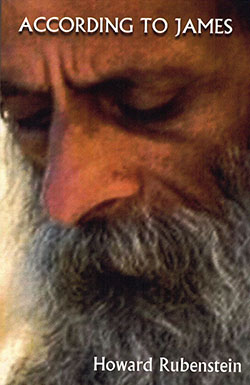
 BOCA RATON, Florida — According to James is an interesting and thoughtful book. Whether readers are Christians, Jews, Muslims, or something else, and even if they strongly disagree with the story Howard Rubenstein tells about James, an older brother of Jesus, they will find that the story prompts them to think about many aspects of religion.
BOCA RATON, Florida — According to James is an interesting and thoughtful book. Whether readers are Christians, Jews, Muslims, or something else, and even if they strongly disagree with the story Howard Rubenstein tells about James, an older brother of Jesus, they will find that the story prompts them to think about many aspects of religion.
The story is fiction. But it is based on the views of many scholars. It was inspired, among other sources, by the work of President Thomas Jefferson who published a version of the New Testament Gospels with the supposed miracles deleted, for Jefferson thought that the accounts of miracles were legends, that Jesus produced no miracles.
In the novel, James, whom Jesus appointed as his successor and interpreter, tells readers about his brother. He mentions what he considered good and bad. He reveals that Jesus did not come to produce a new religion, this was done by Paul, who never met Jesus. Jesus wanted to simply reform some Jewish ideas and practices of his people. Jesus taught that the age of miracles was over, that sacrifices to atone for sins was contrary to the will of God – repentance alone served that purpose, that baptism also did not remove sins – it was simply purification of the body, an outward sign that the person had repented, that the common man should be exalted, that the kingdom of heaven was here now if people would only recognize it, that contrary to the expectations of many Jews the messiah was not coming to bring everlasting peace. And most significantly, Jesus taught that God is not interested in what people believe, but in how they act.
While Howard Rubenstein does not mention it, these teachings about what Judaism teaches, was also the view of Judaism’s greatest philosopher the twelfth century Maimonides. Jesus’s reforms were rejected by Saul of Tarsus who changed his Hebrew name Saul to the Greek name Paul, and Paul’s view, not Jesus’s reforms, was adopted by the Christian church.
Rubenstein tells us that it was only in the fourth century that Jerome was appointed by the pope to create the “canonical” Bible in Latin. Jerome examined the many versions of the New Testament that were circulating and was highly critical of the corruption of the material he had to deal with. No book was exactly the same as other books. Jerome and later Martin Luther criticized Paul for teaching that belief, not behavior, was what God wanted. Jerome’s version of the New Testament was officially accepted in the sixteenth century at the Council of Trent.
James criticized Jesus for making some statements that were unclear, for the times that his brother became angry at people, and felt that some of his teachings were wrong. For his brother was human after all and humans sometimes make mistakes. For example, commenting on Jesus statement on the Sermon on the Mount “Blessed are the docile, for they shall inherit the earth,” James comments. “That is doubtful.” Similarly, when Jesus said “Blessed are those who hunger and thirst for righteousness, for they shall be satisfied,” James comments, “But when?” James also mentions some of his brother’s parable and says they make no sense.
Rubenstein contends that the high priest never said that Jesus was wrong and only a few Jews condemned him. No one can satisfy everyone. He also opined that there was no miracle of Jesus ascending to heaven, some followers of Jesus surreptitiously took his body from the cave where it was initially buried and transported it to a site where Jesus wanted to be buried. He also includes eleven pages of Jesus’s statements that were personal notions that were not from God.
In summary, Rubenstein presents us a depiction of a human Jesus, a man devoted to Judaism, a man who wanted people to give up mistaken ideas.
*
Rabbi Dr. Israel Drazin is a retired brigadier general in the U.S. Army chaplain’s corps and the author of more than 50 books. Howard Rubenstein, M.D., died in September, while his book still was in the process of being published. His wife, Judith Rubenstein, Ph.D, of San Diego, survives him.